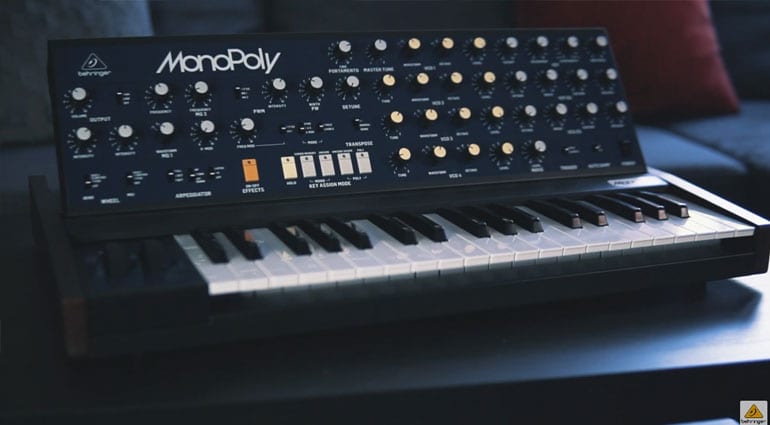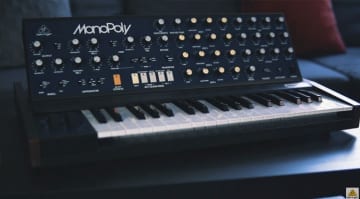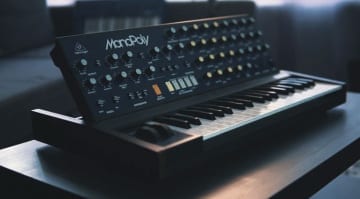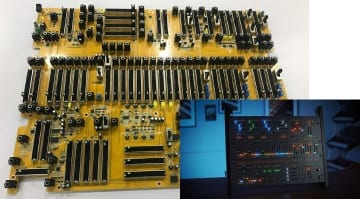Behringer MonoPoly ready for production
Behringer is stacking up the production lines with the MonoPoly to follow the 2600 that has just been rolling off into boxes. Looks like it’s going to be a busy Christmas for synths – but still no price.
MonoPoly
I really liked the look of this one when they revealed its existence with a good looking and good sounding video back in May. They’ve built it as an instrument similar to their Poly D version of the Model D synthesizer which, for me, makes it more interesting that the Eurorackable format they’ve released the Neutron, Pro-One, Cat and other synths in.
The MonoPoly has a more unique look, it has a different vibe and offers a slightly different take with its 4 multiwave oscillators and paraphonic 4-note polyphony. Behringer has added some pulse width modulation and detuning across the oscillators and also an “effects” section which is all about cross-modulation and sync rather than things like delay and chorus.
Behringer says that as with the 2600 they are still working out the price based on how much it takes to produce plus a bit of profit margin. I guess once they’ve produced a bunch they’ll have a better idea. The Poly D which is a very similar synthesizer in terms of size and complexity is currently going for £629. It is quite extraordinary that you can buy a 4-voice Moog Model D clone in a wooden case for so little money. I imagine the MonoPoly will be similar.
So given the choice this Christmas would you opt for the 2600 which people are guessing will retail for somewhere between £600 to £800 or the MonoPoly at probably nearer £600? Different machines though which means you’ll probably need to buy both.
More information
Video
You are currently viewing a placeholder content from YouTube. To access the actual content, click the button below. Please note that doing so will share data with third-party providers.
22 responses to “Behringer MonoPoly ready for production”








Absolutely shameless.
Couldn’t agree more. In addition, most companies figure out the price before production begins, based on R&D investment, production and labor costs and margins; instead of that Behringer cheats the R&D, cuts labor costs to the bone and then feels out the market to see what kind of price their rip-off will bear. It’s a cynical game, but relatively easy for them since there is no love in producing these copies…
get the fuck outta here you bunch of crybabies… you sound salty that your falling apart monopoly that cos thousands will depreciate even more so now that these are out.
Maybe if korg put out an analog reissues behringer wouldn’t have to…
The real thing is still the real thing; no cheap clone will ever replace it.
The originality is what makes it special, and is what Behringer utterly lacks.
And no Rob, Behringer does not “have to…” put out clones; it’s not like some kind of public service they are performing – it is greed-based.
I sold my old junk on vintage hunters and replaced with the clones and they do the job perfect ! Before the synth market there was a nag guitar market, if you don’t play a Gibson or Fender you are not playing music blablabla . This happen now here again . I don’t follow this talk and buy the Behringers
What a moronic thing to say. You could literally apply that logic to the sale of ANYTHING. No Roman, McDonald’s does not “have to” sell Big Macs. They do it because there’s a market for it, simple economics. /thread
Cut the bullsh!t!!
DITO, Behringer is creating a fantastic product and very affordable prices so not just ‘millionaires’ can enjoy the possibilities in their music. I for one am very pleased that they are helping revive the world of analogue for more people to enjoy. How can that be a bad thing for anyone?
Exactly!! I couldn’t agree more! Let everyone who can afford it purchase it and enjoy making music, that should be the end game! These attention whores of “Look what I got, an original TR909 nah nah nah nah nah!” need to STFU and stop being pathetic!!
Glad this has been said!! These fuckers are boohooing because their exclusive club of all that is vintage and overpriced is crumbling in front of their very eyes!! It’s capitalism mofos and the market dictates!!
Still getting an original. At this point I know exactly what synths I want. I’m not wasting money on anything I haven’t played. The beauty of vintage synths is that no two sound the same. I know how to troubleshoot and repair gear so who cares if it’ll need maintenance. You gotta tune a guitar and replace strings and such. It’s something that bonds you to it. Still getting a vintage model d too. I’ve played a bunch and they all sounded different. Yes it’ll all be expensive but I’ll just save up for a while. Keep my wallet closed and my eyes on the prize. I won’t let some cheap new toy keep me from saving for what I really want. Oh and if these new Behringer synths break, you either have to buy a new one, pray that you can buy a new board, or attempt to troubleshoot and repair SMD work. Good luck with that. With the vintage gear, you can just keep repairing it and pass it down to your grandkids. For all the people out there with little cash, go right ahead and buy Behringer if it helps you with your dreams, but if you can save up for a while, hold out and get something vintage, do it. You’ll see why so many people talk about vintage gear. There’s something a little more going on with it. You can feel it, hear it. Ok, I’m ready for the counter comments now. Please begin.
Well said – couldn’t agree more!
Look, I love classic gear, too. I’ve got over 85 HW synths…about half produced before 2000. No doubt that there’s something unique about owning an original.
But PLEASE don’t insult your own intelligence by telling yourself that there’s anything sonically or functionally different about Behringer clones. By and large, even an oscilloscope can’t show the difference. They’re as close as two rolling off of the original lines in most cases.
Except, of course, for the fact that the Behringers cost a tiny fraction of what the vintage stuff does on the USED market, they have MIDI, are lightweight, can be repaired or replaced for next to nothing, and often can be added to a eurorack system seamlessly.
I love my old stuff, but I try to buy every clone I can get. They’re now the ones that actually get used by me because they are reliable, more compatible, and don’t cost a fortune if I screw them up.
Anyone saying otherwise is kidding themselves.
Well put, and say it louder so the ones at the back can hear!!
Their delusion of grandeur has surpassed stupidity!
Yet, really, no one cares much about your opinion. Welcome to obsolescence.
I don’t really care about the ethics behind behringer … If I’m gonna get a 2600 clone for £600 or any other synth for that matter I’m in ..you can’t really have a go a behringer for giving people what they want for a relatively cheap price .even the original manufacturer’s still haven’t grasped this concept yet …fair play to behringer they saw a gap in the market and went for it ..
But you happily overlook the fact that Behringer offer a product line that is something like 80% “clones” of other manufacturers designs and layouts. That’s where I take issue – they are not bringing much of their own to the table, just feeding off of people’s nostalgia and the rarity of older equipment. If Behringer released a mono synth with some other name and completely different panel layout and physical design, but which was under the hood a clone of the 2600, you would not be as interested, because by your own admission you want a 2600 and can not afford one. It’s a cheap play, and shows no imagination – and in the world of synthesizers, imagination is important. But we’re living in a world where “I don’t really care about the ethics…” is something that’s OK to say, so I guess I’m a salty old-timer! Anyway, enjoy your clones!
You’ve obviously never used a Deepmind, a Neutron, or a Crave.
I’d argue that they’re the superior synths in Behringer’s lineup. Not the clones.
In fairly sure that for the number of voices you get, the Deepmind 12 is still far and away the lowest – priced analog polysynth on the market today…by about HALF.
They’ve innovated plenty. With just those 6 synths (there are 4 deepminds), Behringer has produced the most non – clone analog synths of any synth maker in the same time period. Korg gave us 5 (2 Minilogues, 2 Prologues, and a monologue), I think that Roland gave us 3. Moog gave us 4. Yamaha – none. Arturia released 3. DSI, 3. Novation 2 I think.
Those are just NEW synths.
So, no. Behringer is definitely developing stuff better and faster than the others.
You’re right, Brian, I have not played those synths, but I am aware of them.
But for the sake of argument let’s call the Deepmind 6 and 12 desktop and keyed versions one synth for the moment, and keep the ‘original’ products list to 4.
Then compare that to the 14 ‘clones’ of other people’s products (here, not counting the multiple color versions of the MS-1 or TD-3, or each of the specific modules of the System 100 or Moog system modules, or the announced 2600 or UB-Xa). System 100, Moog modules, Odyssey, TD-3, Model D, MS-1, Pro-One, K2, Vocoder, Wasp, Poly D, Cat, RD-6 and RD-8… so fully 70% (not the 80% that I said earlier off the top of my head!) of the product line are clones of other people’s designs, and this is being generous in not calling out the Deepmind as a clone of the Juno in all but looks, which it essentially is.
Crave and Neutron were cool in the sense that they could really claim to be original Behringer products; all I’m saying is that building your “reputation” on issuing copies of other people’s products by a ratio of 3-1 is pretty weak in my opinion.
But I’m just a guy with strong opinions and I’m wasting everyone’s time by rattling on here – sorry to be a complainer.
Enjoy your Behringer clones, and I’ll be standing by and curious to see what else they release that is really original.
Many things are said about Behringer and clones but what I come back to is the fact that this is nothing new. Eurorack was founded on the idea of cloning Moog modular in a smaller and more affordable form. Every Eurorack maker builds their versions of Roland filters or EMS envelopes or Korg filters, Buchla gates, Moog oscillators – it’s a completely normal and usually celebrated part of synthesizer culture. Behringer has the nerve to do it in a bigger and brasher way than most and that feels different somehow to Dinsync or Jomox or AJH or Pittsburgh Modular – but it’s not really different, it’s just perception. Behringer has been running for 30 years building cheaper versions of pro audio gear – they lower the cost barrier to entry for so many people starting out. Their innovation is in terms of cost and efficiency and also competition which ends up being something we all benefit from.
I used to be one of the people who would be on the ‘stop whining about what behringer are doing’ side of things and I’ve got couple of bits of behringer gear, a Neutron which is great but I can definitely see the flaws, once the filter gets to about 11 o’clock it starts to really distort. Also it broke fairly quickly and they took 3 months to fix it. All I did was update the firmware and the lfo got stuck on the slowest speed, it came back with the old firmware, I don’t dare update it.
I also had one of their analog mixing boards, full of features but it hasn’t lasted a year. 2 channels have given up completely, the l/r balance is completely off on another and one channel constantly bleeds into the headphones even if its muted!
The prices of their gear make them very tempting but don’t be fooled, you get what you pay for, don’t compromise on quality as its a false economy.
That’s a really good point re reliability. I sold my juno 106s as the voice chips needed doing and decided to get rid. I still have my sh101 and I have a couple of behringers – the wasp and the model d. I love the sound of both but I do wonder how long they’ll last long term. So much so its put me off buying one of the more expensive models. £250 for a model D is a no brainer especially with gear 4 music 2 year warranty but spending £700 plus becomes a different ball game. I can get my 101 serviced for £150 and it fixes a few issues. Not sure if I would take that risk with a poly d or something similar. I think Begringers sweet spot is in the £250 -£300 bracket with the Pro 1s and Model ds etc
You are currently viewing a placeholder content from Facebook. To access the actual content, click the button below. Please note that doing so will share data with third-party providers.
More InformationYou are currently viewing a placeholder content from Instagram. To access the actual content, click the button below. Please note that doing so will share data with third-party providers.
More InformationYou are currently viewing a placeholder content from X. To access the actual content, click the button below. Please note that doing so will share data with third-party providers.
More Information